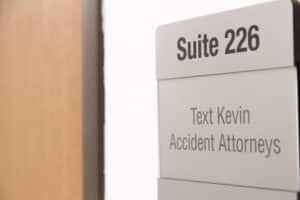Spinal cord injuries are some of the most life-changing kinds of trauma a person can experience. When a person suffers a spinal cord injury (SCI), it means they suffered damage to the nerves in their spinal cord. In many cases, such injuries will completely alter a person’s life, and even the less serious ones will typically require extensive medical care.
If you or a loved one suffered a spinal cord injury through the negligent actions of another person or entity, the spinal cord injury lawyers at Crockett Law can help you recover the compensation you’re owed. Our team has decades of experience in handling SCI cases, and we’ve worked diligently to obtain fair compensation amounts on behalf of the victims we represent.
We understand the challenges and hardships that accompany SCI, and we will make sure that any settlement amount or trial verdict accounts for these damages. Call us today at (888) 965-3827 to schedule a free consultation. We provide free and friendly advice to all our clients on how to move forward with their injury claims.
How Much is My Spinal Cord Injury Case Worth?
Spinal cord injuries are simply any form of damage to any part of the spine. An injury that affects a delicate part of the spinal cord can lead to permanent harm to the motor function, strength, and sensation below the point of injury.
SCIs will often affect almost every aspect of a person’s life and based on how permanent or catastrophic the injuries are, courts will generally award significant compensation awards to the victims. SCI victims deserve financial compensation for a wide variety of damages, including:
Medical expenses: These include the past and future injury-related medical bills, costs of rehabilitation, surgery, and medical equipment like wheelchairs and vehicle/home modifications to accommodate the disability.
Loss of enjoyment and reduced quality of life: This is a poignant area of damages for SCI cases as the victim typically suffers permanent paralysis. It’s always difficult to place an exact dollar value on these life-changing damages, but the California courts have certain calculations they abide by to come up with appropriate figures.
Emotional distress and suffering: Emotional damages are often present in the face of an SCI. The victim has to learn how to live with a permanent motor function and other disabilities. The emotional damages from an SCI can be quite severe.
It’s worth noting that some victims will never leave the hospital following an accident that causes an SCI. Even if someone does survive the initial trauma, they have a higher chance of early mortality. In fact, the life expectancy rates for people living with SCIs are much lower than those without. The first year after the injury has the highest mortality rates, especially when the SCI results in other neurological impairments.
Some of the common causes of death surrounding SCIs include septicemia, pneumonia, urinary/digestive diseases, and accidents. If a loved one lost their life from complications arising from an SCI, you should consider coming to us for help with filing a wrongful death claim.
What are the Most Common Types of Spinal Cord Injuries?
The spinal cord is a very delicate organ, and it will be unable to relay signals from the brain to certain nerves in the body if it undergoes squeezing, compression, slicing, or bruising. From partial movement and strength to total loss of mobility and strength from the neck downwards, this can have a wide variety of symptoms. The most severe injuries to the spinal cord are usually fatal.
Spinal cord injuries can be classified in several different ways by doctors and other medical professionals depending on the severity of the injury and its location. Here are some of the most common classifications:
Sacral Cord Injury: This occurs when the damage is located at the base of the spine. It typically causes leg and hip weakness, bowel or bladder control issues, along with sexual dysfunction.
Paraplegia: This occurs when the spinal cord damage is at the mid or lower back. In most cases, this type of injury will result in weakness in the legs or paralysis, as well as a loss of bladder and bowel control, as well as loss of sensation and sexual functionality.
Tetraplegia or Quadriplegia: This is a spinal cord injury located at the thoracic or cervical cord. It can cause paralysis in the limbs (both legs and arms), a loss of sexual ability, loss of bladder and bowel control, breathing complications, and other serious problems.
Complete: This is perhaps the most severe form of all types of injury. It causes a loss of all motor and sensory functions below the area of spinal cord injury.
Incomplete: This means that the victim suffers a spinal cord injury but manages to retain some form of ability to move below the location of the injury, even though the movement is still limited.
Some patients that are critically injured will need 24/7 care for the rest of their lives, while others will be able to lead independent lives but require a lot of support. The medical costs will go beyond hospital bills and medical care – special equipment, vocational training, psychological counseling, therapy, and home care will all be necessary.
Why Should You See a Doctor Right Away After a Back Injury?
Spinal cord injuries are not always apparent immediately. You might have been in an accident and discounted your injuries. Or you might think that a few trips to a chiropractor or therapist should be able to get you back in business.
As personal injury attorneys, we often come across clients who had minor accidents and their injuries didn’t fully reveal themselves until much later. Without prompt treatment, the condition could worsen. The following are some of the symptoms that might signify a spinal cord injury:
- Extreme pain in the back or neck
- A feeling of numbness in your fingers or toes
- Loss of bowels or bladder control
- Changes in your sexual function
- Difficulty breathing
What are Some of the Causes of Spinal Cord Injuries?
According to recent national statistics, the following five causes account for 96.9% of the reported spinal cord injuries:
Vehicular accidents: 39.3% of spinal cord injuries have been a result of vehicular accidents, since 2015. This includes car accidents, pedestrian accidents, motorcycle accidents, truck accidents, etc.
Falls: From 2015, 31.8% of all spinal cord injuries have been a result of falls, including high falls (e.g. from ladders, buildings, construction sites, etc.) and low falls (e.g. slip and fall accidents). Workplace accidents involving falls are quite common.
Violence: 13.5% of all spinal cord injuries have been a result of acts of violence, especially non-fatal gunshot wounds. Keep in mind that about 37% of non-fatal gunshot wounds are unintentional.
Sporting accidents: 8% of spinal injuries have been as a result of sport-related accidents. Injuries often result from rugby, diving, skiing, gymnastics, football, cycling, and many others.
Medical accidents: 4.3% of spinal cord injuries are attributable to surgical or medical incidents. Medical errors could result from the surgeon, anesthesiologist, surgical assistants, or other members of the team.
What Can I Expect to Recover if I Have a Spinal Cord Injury?
Spinal cord injury cases are categorized under personal injury cases. You can expect to be compensated in three key areas:
Economic damages: these include past and future medical expenses, lost wages and potential for income, equipment and rehabilitation costs, and the costs incurred to modify your home and vehicle to accommodate your disability.
Non-economic damages: These include pain and suffering, emotional distress, loss of enjoyment of life.
Punitive damages: These damages can be awarded by the court in cases where the accident leading to your SCI was caused by a person or entity found to be too reckless, malicious, or under gross disregard for human life.
It’s worth noting that we always try to account for future expenses so that you will be covered for the rest of your life. For younger victims or those who are permanently disabled, we structure the compensation reward such that all the money is not spent at once, using a special needs trust.
How are Spinal Cord Injury Cases Different From Other Personal Injury Cases?
Spinal cord injury cases are different because they have long-term health concerns and will often require long-term care. This translates into a lifetime of costs. However, there are people with SCIs who go on to lead amazing lives; they participate in sports and marathons, go back to work, and even start families.
Is There a Time Limit to File a Spinal Cord Injury Claim?
Since these are personal injury cases, they are covered under the same statute of limitations. In California, the statute of limitations for personal injury cases is two years from the date of the accident.
What if I Got My Spinal Cord Injury While at Work?
In that case, it may be handled as a workers’ compensation claim. This would mean that you are protected as an employee for any injuries that arise while on the job. You don’t even have to prove that your employer was negligent.
Still, if you believe that there was a negligent third-party (such as another individual who attacked you or a drunk automobile driver), you might be able to seek additional compensation through a personal injury lawsuit.
Speak to a San Bernardino, CA Spinal Cord Injury Lawyer Today
At Crockett Law Group, our team of experienced personal injury attorneys has handled countless spinal cord injury cases, and we believe we can help you or your loved one get the justice you deserve.
While money will never be able to replace the pain and suffering caused by SCI, it can certainly help ease the financial burden associated with these kinds of injuries. Get in touch with us at (888) 965-3827 to schedule a free consultation.

















































































































































































